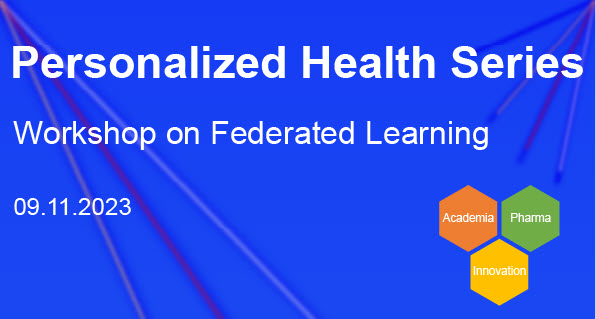Workshop "Federated Learning"
Our Personalized Health Series aims to create exchange opportunities and build a community around academic researchers and private companies’ representatives. The 4th edition focused on 'Federated Learning' and attracted 45 enthusiastic participants from diverse backgrounds.
The program of the workshop highlighted how federated learning can overcome many issues related to sharing sensible clinical data. However, many problems remain beyond technological prowess.
The first keynote was given by Johan van Soest from Maastricht University, who presented the Dutch "Personal Health Train" project. Initially built for research, the project expanded into healthcare, aiming to connect distributed health data for the benefit of citizens and the healthcare system. Despite its technological advancements, the project was slowed down by significant ethical challenges related to data sharing. Overcoming these barriers requires addressing ethical issues alongside technological progress.
Hartmut Schultze from HP Enterprise proposed a solution to the challenges mentioned in the first keynote: the 'swarm learning approach'. This fully decentralized method for sharing sensitive data combines edge computing and blockchain-based networking without requiring a central coordinator, unlike Federated Learning. This approach maintains data sovereignty.
The response to the pitching session exceeded our expectations, showcasing a large variety of projects where the Federating Learning approach plays a crucial role.
- Juan Ramon Troncoso-Pastoriza, Tune Insight, ‘Sharing without sharing: Secure data collaborations in healthcare’
- Philippe Léon-Marius Gottfrois, University of Basel, ‘Federated Learning for inclusive dermatology: breaking barriers in richly pigmented skin analysis’
- Alex Karargyris, MLCommons, ‘MedPerf: A platform for Federated Benchmarking of Medical AI’
- Julia Bielicki, UKBB Basel, and Daniele Malpetti, IDSIA Lugano, ‘SPEARHEAD, a federated approach to risk stratification model for better usage of antibiotics’
- Klaus Kades, MIAC Basel, ‘Kaapana - an open-source toolkit for medical image analysis and federated learning’
- Joachim Schultze, University of Bonn, ‘Swarm Learning for multi-site data applications. Sharing insights – not data’
- Eric Boernert & Dominik Heinzmann, Roche, ‘Practical approaches to federated analytics & learning at scale in real world healthcare systems - industry perspective’
- Stefanie Warnat-Herresthal, University of Bonn, ‘Global Experiment on Swarm Learning for Flow Cytometry Data’
- Maria Scoz, Decentriq, ‘Compliant, scalable health data collaborations for advances in research and treatment’
- Benito Benitez, University Hospital Basel, ‘Digital solutions for pediatric craniofacial anomalies’
The final session, moderated by Bram Stieltjes, featured a diverse group, including Hartmut Schultze, from HP Enterprise, Dominik Heinzmann, from Roche, Juan Ramon Troncoso-Pastoriza from Tune Insight and Alfred Früh, from the Faculty of Law of the University of Basel. The panel discussion provided a unique perspective, enriching the debate: What are data? To whom do they belong? They collectively agreed that the federated learning approach could help addressing critical patient privacy concerns, which are still awaiting comprehensive legal clarification.


